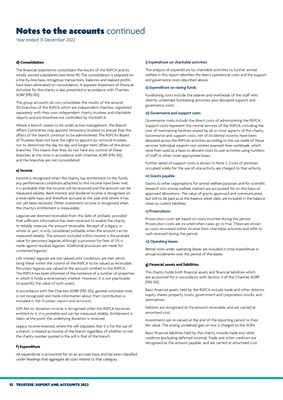
TRUSTEES' REPORT AND ACCOUNTS 2022
52 d) Consolidation
The financial statements consolidate the results of the RSPCA and its
wholly owned subsidiaries (see Note 19). The consolidation is prepared on
a line-by-line basis. Intragroup transactions, balances and realised profits
have been eliminated on consolidation. A separate Statement of Financial
Activities for the charity is also presented in accordance with Charities
SORP (FRS 102).
The group accounts do not consolidate the results of the around
150 branches of the RSPCA which are independent charities, registered
separately with their own independent charity trustees and charitable
objects and are therefore not controlled by the RSPCA.
Where a branch ceases to be under active management, the Branch
Affairs Committee may appoint temporary trustees to ensure that the
affairs of the branch continue to be administered. The RSPCA's Board
of Trustees does not have the right to appoint (or remove) trustees
nor to determine the day-to-day and longer-term affairs of the down
branches. This means that they do not have any control of these
branches at this time in accordance with Charities SORP (FRS 102),
and the branches are not consolidated.
e) Income
Income is recognised when the charity has entitlement to the funds,
any performance conditions attached to the income have been met,
it is probable that the income will be received and the amount can be
measured reliably. Bank interest and dividend income is recognised on
a receivable basis and therefore accrued at the year end where it has
not yet been received. Other investment income is recognised when
the charity's entitlement is measurable.
Legacies are deemed receivable from the date of probate, provided
that sufficient information has been received to enable the charity
to reliably measure the amount receivable. Receipt of a legacy, in
whole or part, is only considered probable when the amount can be
measured reliably. The amount included within income is the probate
value for pecuniary legacies although a provision for fees of 5% is
made against residual legacies. Additional provisions are made for
contested legacies.
Life interest legacies are not valued until conditions are met which
bring these within the control of the RSPCA to be valued as receivable.
Pecuniary legacies are valued at the amount notified to the RSPCA.
The RSPCA has been informed of the existence of a number of properties
in which it holds a reversionary interest. However, it is not practicable
to quantify the value of such assets.
In accordance with the Charities SORP (FRS 102), general volunteer time
is not recognised and more information about their contribution is
included in the Trustees' report and accounts.
Gift Aid on donation income is recognised when the RSPCA becomes
entitled to it, it is probable and can be measured reliably. Entitlement is
taken at the point the underlying donation is received.
Legacy income received, where the will stipulates that it is for the use of
a branch, is treated as income of the branch regardless of whether or not
the charity number quoted in the will is that of the branch.
f) Expenditure
All expenditure is accounted for on an accruals basis and has been classified
under headings that aggregate all costs related to that category.
i) Expenditure on charitable activities
The analysis of expenditure by charitable activities to further animal
welfare in this report identifies the direct operational costs and the support
and governance costs described above.
ii) Expenditure on raising funds
Fundraising costs include the salaries and overheads of the staff who
directly undertake fundraising activities, plus allocated support and
governance costs.
iii) Governance and support costs
Governance costs include the direct costs of administering the RSPCA.
Support costs represent the central services of the RSPCA, including the
cost of maintaining facilities shared by all or most aspects of the charity.
Governance and support costs, net of incidental income, have been
allocated across the RSPCA's activities according to the use made of those
services. Individual support cost centres assessed their workloads, which
were then used as a basis to allocate costs to user activities using numbers
of staff or other more appropriate bases.
Further detail of support costs is shown in Note 3. Costs of premises
occupied solely for the use of one activity are charged to that activity.
iv) Grants payable
Grants to other organisations for animal welfare purposes and for scientific
research into animal welfare matters are accounted for on the basis of
approved allocations. The value of grants approved and communicated,
but still to be paid as at the balance sheet date, are included in the balance
sheet as current liabilities.
v) Prosecutions
Prosecution costs are based on costs incurred during the period.
Prosecution costs are incurred when cases go to trial. These are shown
as costs recovered within Income from charitable activities and refer to
cash received during the period.
vi) Operating leases
Rental costs under operating leases are included in total expenditure in
annual instalments over the period of the leases.
g) Financial assets and liabilities
The charity holds both financial assets and financial liabilities which
are accounted for in accordance with Section 11 of the Charities SORP
(FRS 102).
Basic financial assets held by the RSPCA include trade and other debtors,
equity shares, property trusts, government and corporation stocks, and
alternatives.
Debtors are recognised at the amount receivable, and are carried at
amortised cost.
Investments are re-valued at the end of the reporting period to their
fair value. The arising unrealised gain or loss is charged to the SOFA.
Basic financial liabilities held by the charity include trade and other
creditors (excluding deferred income). Trade and other creditors are
recognised at the amount payable, and are carried at amortised cost.
Notes to the accounts continued
Year ended 31 December 2022